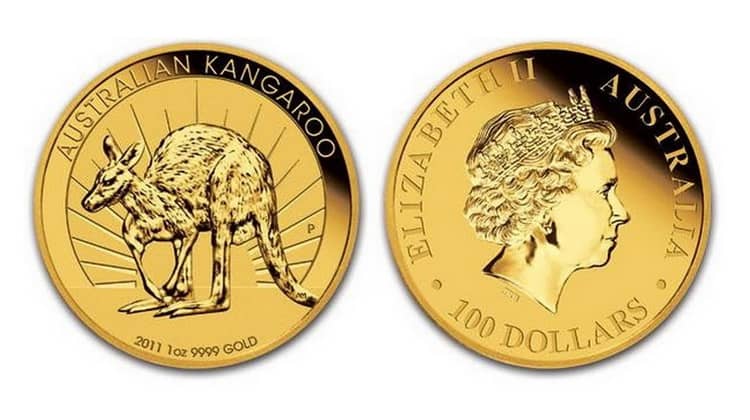
100 Australian dollars is a large collection of investment coins. Each one is made of precious metal (gold, silver, and platinum), so they all have the highest value in the world of numismatics. You can find all Australian gold and Silver coins in our catalog. Coins minted by the mint of Perth (Australia’s oldest manufacture) have a special place among the other popular coins. Since 1986, limited circulation of the Australian coins of the Gold Nugget and Lunar series have been minted at the manufacture, as well as the collection of Australian gold coins of the Kangaroo series.
History
The first investment coin of 100 Australian dollars was issued in 1986. It was a part of the “Golden Nugget” collection. This series is dedicated to the large nuggets of the fifth continent. The reverse is decorated with the second largest gold nugget in the world – Welcome Stranger. It was found in 1869 by two men John Deason and Richard Oates. The weight of the deposit was 78.4 kg. It did not survive until our days. It was immediately sent for melting, without making a single photo. The reproduction of a nugget for the coins was made later on the basis of two drawings, one of which was created by Francis Fearn, and the second by Charles Weber. All 100 Dollars Australian gold coins in our catalog.
Do you know? The actual value of platinum and gold coins, as a rule, is much higher than the indicated face value. The price for some coins is constantly fluctuating, but since Platinum is rarer metal than gold or silver, investors and collectors prefer to recognize its value. Also, the cost of collections increases the deficit of some items – the rarest ones are issued in a 100-dollar equivalent.
The “Gold Nugget” series was issued three years in a row (1986-1988) in various circulations (from 15,000 to 259,000). At that time, the coin had a unique two-tone design, which made it favorably different from the collectible and investment copies of other countries. However, in 1989, Perth Mint stopped minting this series, replacing it with a more popular collection of Australian gold coins, the Kangaroo series. The reason for that was the opinion of Australian people. They thought the nuggets on the reverse looked more like meteorites and they wouldn’t be able to become a symbol of Australia.
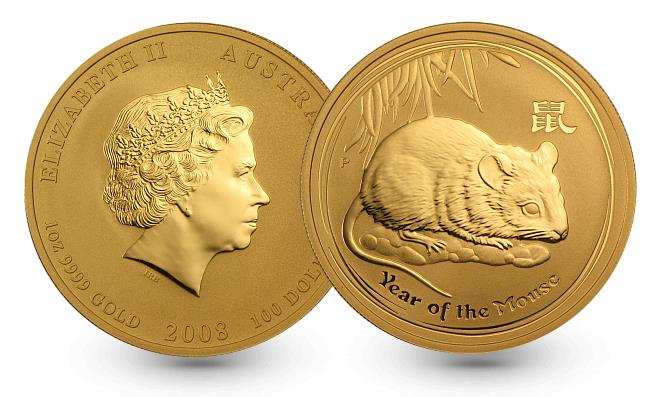
Do you know? When the first fleet arrived on the territory of Australia, it was decided that money was not needed on the mainland. Rum was one of the original forms of currency. This situation lasted for 25 years. The first coins appeared in 1813. In 1910, silver coins were issued. Today, Australian money has a leading position on the market, and it is in great demand.
In 1989, the first series of investment coins was issued, which was decorated with the iconic symbol of Australia – the Kangaroo. Since then, every year (from 1989 to 2014) a limited edition of different denominations (2; 5; 15; 25; 50; 100; 200; 100; 3,000 $) was issued. The design of the reverse was constantly changing. That caused even greater excitement among the collectors. The Australian $ 100 was issued from 1989 to 1993, then from 1996 to 1998, in 2012, and in 2014.
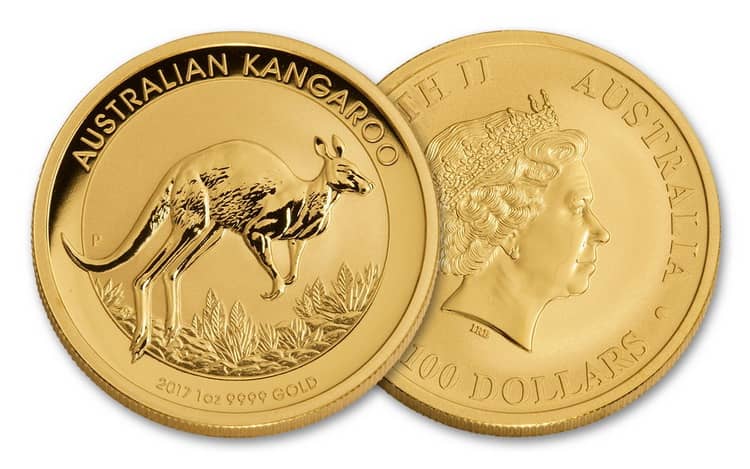
Do you know? Coins depicting a red kangaroo are issued admirably frequently. The only coins that keep up with their annual change of design are gold Chinese coins with panda.
In 1988, the issue of a limited series of coins with other Australian symbols, the koala, wedge-tailed eagle and white shark, was launched. The image of a koala is depicted on the reverse of the investment copies of even more expensive metal, platinum. The collection was enriched by coins minted with Proof technology (the best metalworking technique and safety) in 1990, then in 1992, 1993, 1994, and 1995. The next circulation of 100 Australian gold dollars with the image of koalas was issued in 2012, 2013, 2014 and 2015. Three series of coins are dedicated to the wedge-tailed eagle (2015 – gold, 2016 – platinum, 2017 – gold).
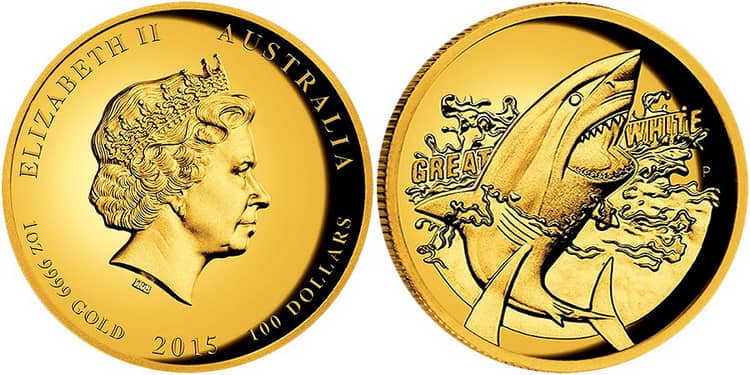
Do you know? The best-selling series of Australian platinum coins is the “Koala”. Platinum collection of investment coins with one of the fifth continent’s symbols was the first successful issue, made from this metal. Other series were withdrawn from the production, but not koalas. The coins are minted year after year because they are still very valuable for collectors and investors.
There are Australian gold coins of the Lunar series among other 100 Australian dollars. The collection is known for the fact that a new item comes out every year. “Lunar” is issued in chronological order: a new year – a new circulation with the image of an eastern symbol on the reverse. Due to its characteristics, the numismatic value of these coins is constantly growing.
100 dollars of the “Lunar” series are:
- “Year of the Monkey” – 2004;
- “Year of the Ox” – 2009;
- “Year of the Dragon” – 2000 and 2012;
- “Year of the Rooster” – 2017.
Coins with a face value of 15, 25, 50 Australian dollars are also in this series. You can find all 15 Dollars and 50 Dollars Australian gold coins in our catalog. In 2008, 2011 and 2015, an interesting and unusual series of “Treasures of Australia” was issued. One hundred dollar coin has a locket in it, which contains the natural treasures of the continent. There were five types of coins issued in total – with gold, pearls, sapphires, opals, and diamonds. This idea belongs to the Mint of Perth.

Do you know?
The most expensive coin of the Lunar series is 100 Australian dollars of 2000 with the dragon on the reverse. A dragon plays a central role in Chinese myths, vast collection of ancient legends, myths and cultural beliefs.
Design
Golden Nugget
Metal: gold
Weight: 31.10 g
Diameter: 32.10 mm
Obverse: portrait of Queen Elizabeth II; inscription ELIZABETH II, AUSTRALIA, 100 DOLLARS.
Reverse: nugget “Welcome Stranger”; inscription AUSTRALIAN NUGGET, 1 oz., FINE GOLD, year of minting.
Koala
Metal: Platinum
Weight: 31.185 g
Diameter: 31.1 mm
Obverse: portrait of Queen Elizabeth II; inscription ELIZABETH II, AUSTRALIA, 100 DOLLARS.
Reverse: koala in the natural habitat, surrounded by eucalyptus; inscription THE AUSTRALIAN KOALA, 1 OZ 9995 PLATINUM, year of minting.
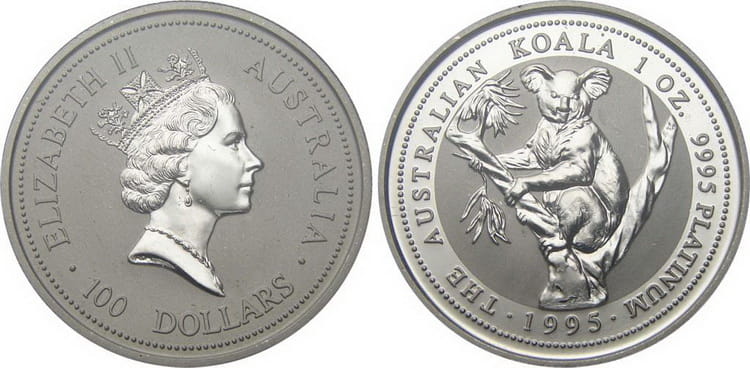
Lunar
Metal: gold
Weight: 32.10 g
Diameter: 32.10 mm
Obverse: portrait of Queen Elizabeth II; inscription ELIZABETH II, AUSTRALIA, 100 DOLLARS.
Reverse: image of an oriental animal; Chinese hieroglyph; year of minting; inscription1 OZ 9999 GOLD.
Wedge-tailed eagle 2016
Metal: Platinum
Weight: 31.1 g
Diameter: 39.34 mm
Obverse: portrait of Queen Elizabeth II; inscription ELIZABETH II, AUSTRALIA, 100 DOLLARS.
Reverse: profile of an eagle on top of a tree; inscription AUSTRALIAN WEDGE-TAILED EAGLE, year of minting 2016, 1 OZ 9995 PLATINUM.
Treasures of Australia
Metal: gold
Weight: 31.7 g
Diameter: 36.1 mm
Obverse: portrait of Queen Elizabeth II; inscription ELIZABETH II, AUSTRALIA, year of minting, 1 OZ 9999 GOLD, 100 DOLLARS.
Reverse: abstract interpretation of the Australian desert.
Circulation
- Gold nugget – 1986 – 15,000; 1987 – 259,000; 1988 – 116,000;
- Koala – 1988 – 61,682; 1990 – 3,500; 1991 – 76,000; 1992 – 72,000; 1993 – 80,000; 1994 – 100,000;
- Lunar – “Year of the Monkey” – 30,000; “Year of the Ox” – 20,000; “Year of the Dragon 20,000”;
- Treasures of Australia – opal, pearls, gold, diamond – 1,000; sapphire – 750.
Cost
Gold nugget – from $ 606;
Koala – from $ 1,300;
Lunar – from $ 320;
Treasures of Australia – from $ 2,500.
Austrian 100 Dollars gold coins in the GoldAdvert catalogue
Comments
No commens yet.